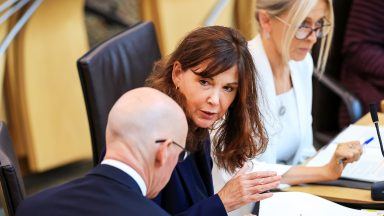Nearly half of senior hospital doctors in Scotland aged 50 and over intend to retire before normal pension age as burnout and financial concerns take their toll, according to new research.
The study by the University of Dundee also found that about 30% of this cohort intend to work to or beyond normal pension age.
Researchers said that with Scotland already facing challenges to train, recruit and retain doctors in some specialties, the findings suggest the NHS will face significant workforce planning issues in the future.
The survey, carried out in December 2022, found that financial concerns including the pension taxation regime was the main reason given by doctors for their intention to retire before normal pension age and/or scale down work commitments.
Disillusionment and dissatisfaction with the ways in which NHS values are being enacted by the system and their employers were the second most common reason given for intention to retire prematurely.
Researchers at Dundee’s School of Business were commissioned by NHS employers in Scotland, the British Medical Association (BMA) Scottish consultants committee, and the Academy of Medical Royal Colleges and Faculties in Scotland to produce what is said to be the largest and most comprehensive survey of doctors’ retirement intentions compiled to date.
They found 47.65% of doctors aged 50 and above intend to retire before normal pension age.
Graeme Martin, professor of management at the university and lead author of the report, said: “Even allowing for the recent pension taxation reforms possibly removing a major source of grievance, the level of doctors’ disillusionment with the system and their employers is sufficiently strong to severely challenge their sense of optimism over a better future for the NHS.
“The NHS needs to address the causes of these issues and provide evidence that an exciting near future is a distinct possibility.”
Estimates in the report indicate that in the 55+ cohort group, doctors intend to retire at the age of 58, which is two years before their normal pension age.
For the 50-54 cohort and those under 50, the estimated retirement age is 60 – well below the normal pension age of 65-68 for this age group.
Most doctors intend to transition into retirement by scaling down work commitments, the study found.
Only 22% of the total sample do not intend to scale down as they approach retirement.
Dr Alan Robertson, chairman of the BMA Scottish consultants committee, said the study, titled Senior Hospital Doctors’ Intentions To Retire In NHS Scotland, reveals the scale of the “massive challenge” Scotland faces to retain senior doctors in the NHS.
He said: “We have warned for years that the way doctors are treated towards the end of their careers means many are being so worn down they are simply calling time early.
“This is costing the health service years of possible service from highly skilled professionals who have spent their whole careers gaining hugely valuable experience caring for the people of Scotland.
“This report should put the validity of these warnings and the hugely serious impact they are having beyond doubt.
“For too long, the concerns of senior doctors have either not been listened to or not acted on effectively and we now have a situation where 50% are planning on not working through to their retirement age. That’s a damning indictment on how we care for our doctors – and should be a major concern for all those relying on our NHS and its staff.
“At a time when our NHS is desperately struggling and patients are suffering as a result, this simply must now be the turning point when we finally see comprehensive action to ensure we do retain the senior doctors we desperately need.”
Professor Andrew Elder, president of the Royal College of Physicians of Edinburgh, added: “Our college has argued consistently that the Scottish Government must, as a policy priority, significantly increase efforts to retain physicians working in our NHS – in addition to recruiting additional new doctors and boosting medical school places – and this report is yet more evidence of how important and urgent this is and will be going forward. Comprehensive workforce planning that prioritises staff retention at all levels is absolutely vital.
“All age groups within the medical workforce are important – doctors over 50 years of age have much experience and technical, clinical, teaching and leadership skills that should not be lost prematurely. Their morale impacts on those under this age – as such, improving their situation will also support those in more ‘junior’ stages of their careers.
“We would urge the new cabinet secretary for health to consider this report carefully and work with stakeholders, including the Medical Royal Colleges, to address the issues raised within it and introduce new, more flexible working conditions while offering better support for physicians. Failure to improve the retention of senior hospital doctors will have an inevitable impact on patient care and service provision and we must avoid the situation deteriorating.”
A Scottish Government spokesman said: “The publication of this joint survey will give NHS employers a clear understanding of the issues facing our highly valued Consultant staff.
“It will allow us to work in partnership with BMA Scotland and NHS Boards through our established structures to address the issues raised in this report, ensuring that NHS Scotland is able to attract and retain doctors at all stages in their career.”
Follow STV News on WhatsApp
Scan the QR code on your mobile device for all the latest news from around the country





























